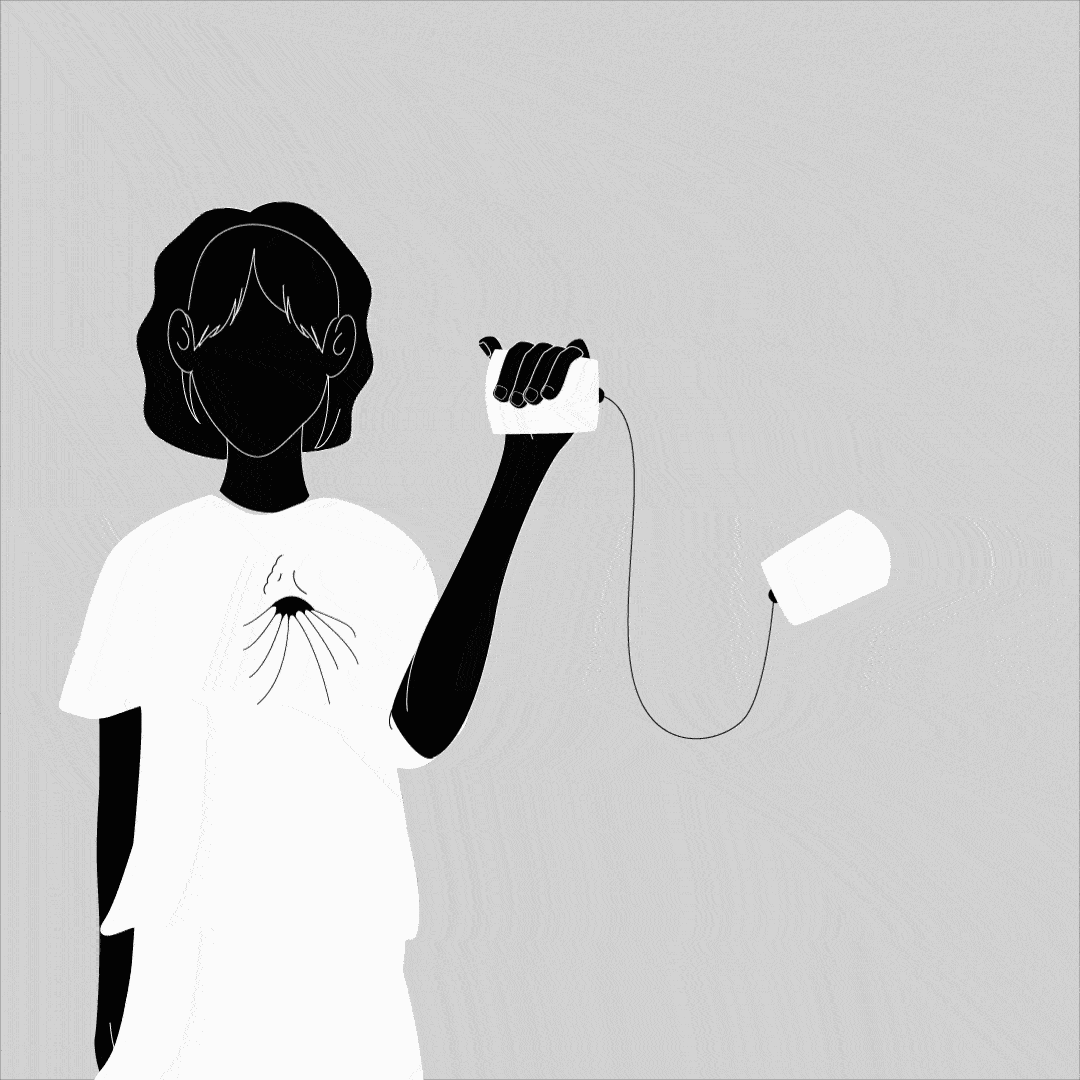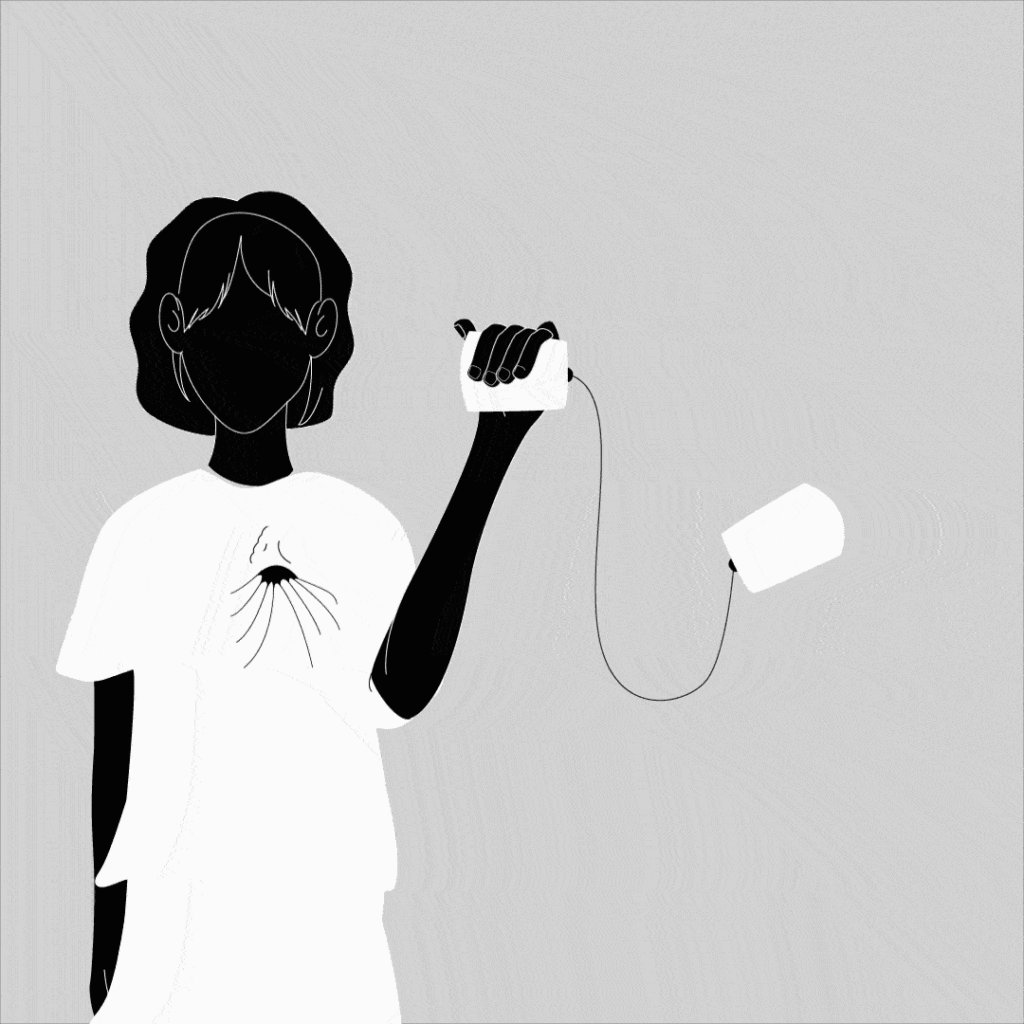BULLISM AS PART OF SOCIETY, CONSEQUENCES AND THE WAR AGAINST IT!
The consequences of bullying can have both short-term and long-term effects on all people involved, both psychologically (including depression, anxiety, low self-esteem, etc.), physically (such as physical injuries, etc.) but also in academic performance. Individual experiences show that in our society it can often happen that victims of bullying are not protected by others but remain alone. Consequently, there is a lack of awareness of the consequences of what bullying can cause the victim.
Illustration: Argjira Kukaj

Bullying as a negative phenomenon has existed for a long time now. Bullying is unwanted, aggressive behavior that involves a real or perceived imbalance of power. The behavior is repetitive, or has the potential to be repetitive, over time. Bullying can happen anywhere and anytime. Although in most cases bullying occurs in adolescents, it can also be present in adults. If we do not prevent such behavior, then it risks being normalized as behavior and becoming our daily routine.
Bullying exists in several forms, such as verbal, physical, and social bullying.
According to Psychology Today, bullying often occurs in and around school and playgrounds, although recently the internet has also been an environment where the phenomenon of bullying has become particularly troubling. The consequences of bullying can have both short-term and long-term effects on all people involved, both psychologically (including depression, anxiety, low self-esteem, etc.), physically (such as physical injuries, etc.) but also in academic performance. Individual experiences show that in our society it can often happen that victims of bullying are not protected by others but remain alone. Consequently, there is a lack of awareness of the consequences of what bullying can cause the victim. Of particular concern are the psychological consequences because, the loneliness created within oneself, not wanting and being afraid to express with their experiences, not even with family members, can then cause various consequences that lead to the development of anxiety and depression. Their world can turn into a dark and uninhabitable place. All this condition can have fatal consequences. But it can happen that people do not understand what it means to be a victim of bullying and the consequences it can cause.
A study conducted in February this year by the research company “Pyper”, says that bullying is most present in high schools and primary schools, while a smaller percentage is in universities / colleges.
Of all educational institutions, participants consider that the phenomenon of bullying is most present in secondary schools (58.31%) and primary schools (31.94%) as well as in a smaller percentage in university / college (4.37%). It is also worth noting that of all the types of bullying present in Kosovo, verbal bullying (55.79%) was considered as the most present type of bullying by the participants, leaving behind the cyber bullying (25.16%), as well as physical (17.91 %) “, Is written in the report of” Pyper “.
According to data on the stopbullying.gov platform, there is not a single profile of a person involved in bullying. Youths who bully may be either well-connected with society or marginalized, and may be bullied by others as well. Similarly, those who are bullied sometimes bully others.
For example, simple but very delicate cases are groups that are formed in the classroom and some of them remain not being accepted by anyone in their groups. Each of us has a case where we have felt inferior at least once. If the question arises as to how we feel or feel those moments of course the answer is clear: worthless, unlike others, lonely and redundant among them. Then why not stop for a minute knowing all the evils that this phenomenon is causing, why do not we help the victims of bullying but stop and laugh together with the bully and make him even more ‘special’? Why not start making a radical change in our cultures to eliminate this phenomenon and not leave room for it in our societies? The perpetrators are now the isolated ones, not the victims. We need to help them change and support those who are victims of bullying to overcome this.
It is therefore important to invest in education and socialization programs from the family, school and community, because depending on how children are educated and socialized, they will implement those behaviors in their societies, whether at school or street. Care must be taken in how we treat others. Teachers and educators should also be engaged in preventing this negative phenomenon, because, among other things, they are also a mirror for students. Work to address bullying, because together we can make up for our shortcomings because despite the fact that we are all different, we are equal.
About the author: Kaltrinë Hyseni, 19 years old from Podujeva, is a first year student at the Faculty of Law-UP.
This grant is supported by the ‘Civil Society programme for Albania and Kosovo’, financed by the Norwegian Ministry of Foreign Affairs and managed by Kosovar Civil Society Foundation (KCSF) in partnership with Partners Albania for Change and Development (PA). The content and recommendations do not represent the official position of the Norwegian Ministry of Foreign Affairs and Kosovar Civil Society Foundation (KCSF).
BULLISM AS PART OF SOCIETY, CONSEQUENCES AND THE WAR AGAINST IT!
The consequences of bullying can have both short-term and long-term effects on all people involved, both psychologically (including depression, anxiety, low self-esteem, etc.), physically (such as physical injuries, etc.) but also in academic performance. Individual experiences show that in our society it can often happen that victims of bullying are not protected by others but remain alone. Consequently, there is a lack of awareness of the consequences of what bullying can cause the victim.
Illustration: Argjira Kukaj

Bullying as a negative phenomenon has existed for a long time now. Bullying is unwanted, aggressive behavior that involves a real or perceived imbalance of power. The behavior is repetitive, or has the potential to be repetitive, over time. Bullying can happen anywhere and anytime. Although in most cases bullying occurs in adolescents, it can also be present in adults. If we do not prevent such behavior, then it risks being normalized as behavior and becoming our daily routine.
Bullying exists in several forms, such as verbal, physical, and social bullying.
According to Psychology Today, bullying often occurs in and around school and playgrounds, although recently the internet has also been an environment where the phenomenon of bullying has become particularly troubling. The consequences of bullying can have both short-term and long-term effects on all people involved, both psychologically (including depression, anxiety, low self-esteem, etc.), physically (such as physical injuries, etc.) but also in academic performance. Individual experiences show that in our society it can often happen that victims of bullying are not protected by others but remain alone. Consequently, there is a lack of awareness of the consequences of what bullying can cause the victim. Of particular concern are the psychological consequences because, the loneliness created within oneself, not wanting and being afraid to express with their experiences, not even with family members, can then cause various consequences that lead to the development of anxiety and depression. Their world can turn into a dark and uninhabitable place. All this condition can have fatal consequences. But it can happen that people do not understand what it means to be a victim of bullying and the consequences it can cause.
A study conducted in February this year by the research company “Pyper”, says that bullying is most present in high schools and primary schools, while a smaller percentage is in universities / colleges.
Of all educational institutions, participants consider that the phenomenon of bullying is most present in secondary schools (58.31%) and primary schools (31.94%) as well as in a smaller percentage in university / college (4.37%). It is also worth noting that of all the types of bullying present in Kosovo, verbal bullying (55.79%) was considered as the most present type of bullying by the participants, leaving behind the cyber bullying (25.16%), as well as physical (17.91 %) “, Is written in the report of” Pyper “.
According to data on the stopbullying.gov platform, there is not a single profile of a person involved in bullying. Youths who bully may be either well-connected with society or marginalized, and may be bullied by others as well. Similarly, those who are bullied sometimes bully others.
For example, simple but very delicate cases are groups that are formed in the classroom and some of them remain not being accepted by anyone in their groups. Each of us has a case where we have felt inferior at least once. If the question arises as to how we feel or feel those moments of course the answer is clear: worthless, unlike others, lonely and redundant among them. Then why not stop for a minute knowing all the evils that this phenomenon is causing, why do not we help the victims of bullying but stop and laugh together with the bully and make him even more ‘special’? Why not start making a radical change in our cultures to eliminate this phenomenon and not leave room for it in our societies? The perpetrators are now the isolated ones, not the victims. We need to help them change and support those who are victims of bullying to overcome this.
It is therefore important to invest in education and socialization programs from the family, school and community, because depending on how children are educated and socialized, they will implement those behaviors in their societies, whether at school or street. Care must be taken in how we treat others. Teachers and educators should also be engaged in preventing this negative phenomenon, because, among other things, they are also a mirror for students. Work to address bullying, because together we can make up for our shortcomings because despite the fact that we are all different, we are equal.
About the author: Kaltrinë Hyseni, 19 years old from Podujeva, is a first year student at the Faculty of Law-UP.
This grant is supported by the ‘Civil Society programme for Albania and Kosovo’, financed by the Norwegian Ministry of Foreign Affairs and managed by Kosovar Civil Society Foundation (KCSF) in partnership with Partners Albania for Change and Development (PA). The content and recommendations do not represent the official position of the Norwegian Ministry of Foreign Affairs and Kosovar Civil Society Foundation (KCSF).


